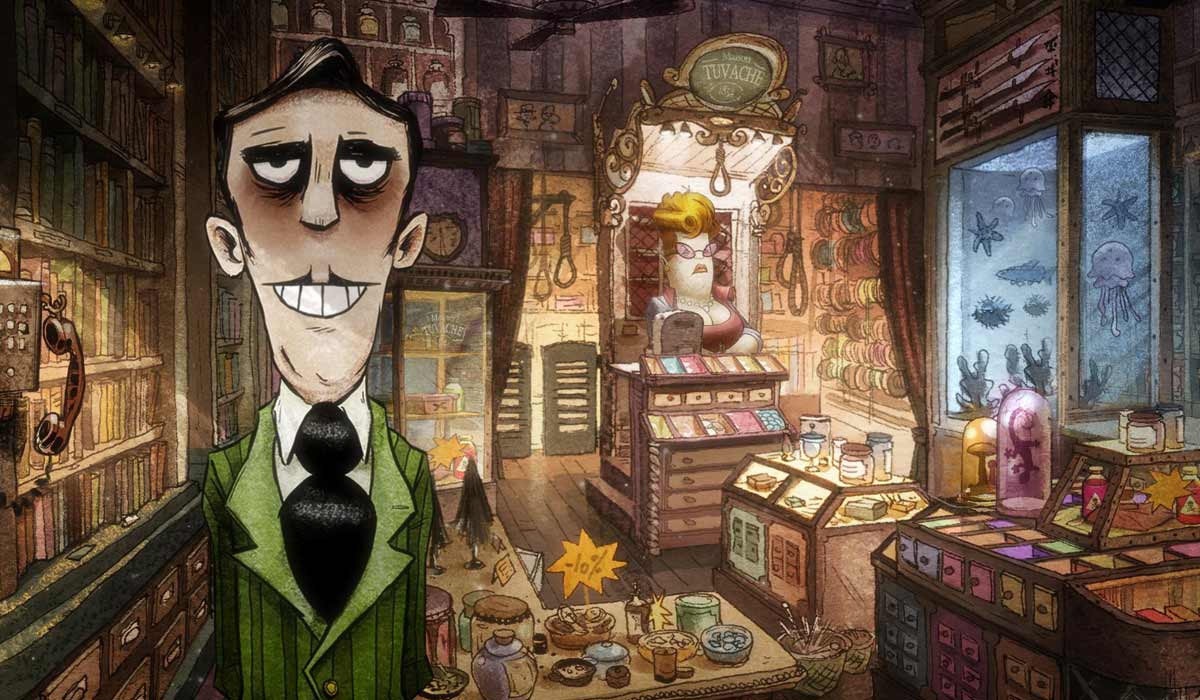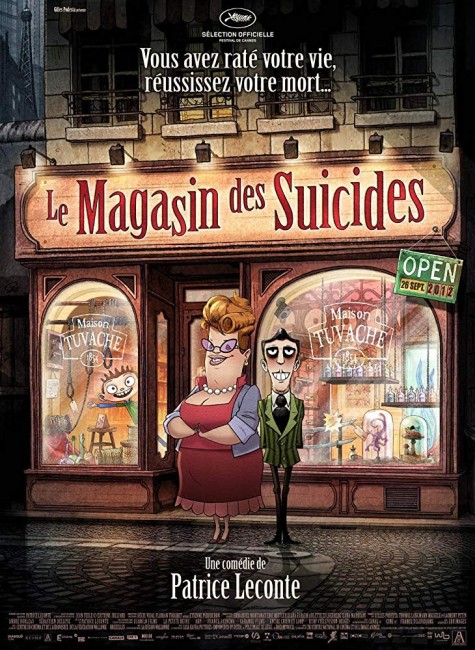(Le Magasin Des Suicides)
France/Canada/Belgium. 2012.
Crew
Director/Screenplay – Patrice Leconte, Based on the Novel The Suicide Shop (2006) by Jean Teule, Producers – Sebastien Delloye, Thomas Langmann, Laurent Petin, Michele Petin, Gilles Podesta & Andre Rouleau, Music – Etienne Perruchon, Art Direction – Florian Thouret. Production Company – Caramel Films/Diabolo Films/Le Petite Reine/ARP/France 3 Cinema/Entre Chien et Loup/RTBF/Eurimages/Le Region Wallone/Casa Kafka Pictures – Dexia/Pole Images de Liege/Dreamtouch/Cente de Cinema de Audiovisuel de la Federation Wallone-Bruxelles/Telefilm Canada/SODEC.
Plot
The Tuvache family – father Mishima, mother Lucrece and two children Vincent and Marilyn – run the Magasin des Suicides, a shop that offers a wide selection of items of despatch to the suicidally minded. Lucrece gives birth to a new baby boy that they name Alan. As he grows up however, Alan has a cheerfulness and happiness that goes against the dour gloom that the rest of the family maintains and is constantly upsetting the mood they try to convey to customers. After Alan gives Marilyn a veil and some oriental music for her birthday, she discovers herself. Alan and his friends then decide to hatch a plan to stop people killing themselves and turn the family business into something cheerful.
The Suicide Shop is the first venture into animation from French director/comic-book writer Patrice Leconte. Leconte has been directing in live-action since the 1970s and reached critical acclaim on the arthouse circuit with films such as Monsieur Hire (1989), The Girl on the Bridge (1999), The Widow of Saint-Pierre (2000), The Man on the Train (2002) and Intimate Strangers (2004), to name but the most famous. The film is based on a popular 2007 novel by author/cartoonist Jean Teule.
With The Suicide Shop, you get the impression that Patrice Leconte has set out to make an animated film that is about as diametrically opposed to the cute, cuddly feelgood niche that most animated films get slotted into in the US mainstream. The film’s tone is like a more deadpan and comically fatalistic version of The Addams Family (1991). As such, with its characters constantly enjoying misery and gloom, exhorting others to think upon the bleak in life and so on, The Suicide Shop comes close at times to being a one-joke film.
At least, it takes the joke one step beyond The Addams Family, which saw that all of its enjoyment of gloom and the Gothic was a rebellion against stifling WASP values, and figures that such constant veneration of suffering and the depressing gets boring after awhile. It then introduces an irrepressibly cheerful boy and has him slowly warm the family over. This is the essence of the film’s arc and it works with likeably charming results.

The Suicide Shop (alas not screened here in its original 3D format) is a film where Patrice Leconte and the various animators have borrowed more than a few strokes from another Franco-Canadian animated arthouse hit – The Triplets of Belleville (2003). The characters in The Suicide Shop are not as stylised but the elongated figures and the pencil-shading of the figures look very similar. The background details of the city and in particular the shop, which bursts with colour and detail, are well accomplished.
Patrice Leconte takes to the animation with an undeniable flair. There are some particularly amusing sequences – the one where Marilyn makes her discovery of sensuality dancing beneath a veil; an amusing one where the boys wreck the shop using a parked car with booming exterior-mounted speakers, ending with a fight between both sides to reach the keys as they are jiggled from one side to the other underneath the car by the vibrations from the music. Nothing particularly earth-shattering but the film works rather enjoyably and produces a number of amusements.
Trailer here


